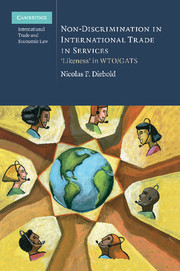Book contents
- Frontmatter
- Contents
- Foreword
- Acknowledgements
- Abbreviations
- List of Cases
- List of Legal Texts
- List of Documents
- Introduction
- PART I Foundations
- PART II Framing the conceptual breadth of ‘likeness’ in GATS
- PART III GATS specific ‘likeness’ issues
- PART IV Methodology for the ‘likeness’ analysis in GATS
- 13 The border tax adjustments framework
- 14 Applying market definition theories to ‘likeness’
- 15 The PPM-problem in the GATS ‘likeness’ context
- 16 Concluding summary: substitutability framework
- Summary of conclusions
- Bibliography
- Index
16 - Concluding summary: substitutability framework
Published online by Cambridge University Press: 10 January 2011
- Frontmatter
- Contents
- Foreword
- Acknowledgements
- Abbreviations
- List of Cases
- List of Legal Texts
- List of Documents
- Introduction
- PART I Foundations
- PART II Framing the conceptual breadth of ‘likeness’ in GATS
- PART III GATS specific ‘likeness’ issues
- PART IV Methodology for the ‘likeness’ analysis in GATS
- 13 The border tax adjustments framework
- 14 Applying market definition theories to ‘likeness’
- 15 The PPM-problem in the GATS ‘likeness’ context
- 16 Concluding summary: substitutability framework
- Summary of conclusions
- Bibliography
- Index
Summary
Part IV seeked to develop a methodology for the analysis of ‘likeness’ in GATS non-discrimination rules, using the Border Tax Adjustments framework from GATT and WTO jurisprudence on ‘like products’ as a starting point. The criteria of this framework have been subject to continuous evolution and the test has been applied very inconsistently by different GATT 1947 and WTO panels. The Appellate Body in EC – Asbestos eventually clarified the structure of the Border Tax Adjustments test. It found that the framework must be applied in view of determining the competitive relationship and that each criteria has its independent and individual significance. Consequently, in spite of the Appellate Body's commitment to an economic analysis of ‘likeness’, competing products could still be found ‘unlike’ on the basis of differences in their properties, nature and quality. To the extent that future WTO jurisprudence continues to apply the Border Tax Adjustments criteria, it is submitted that the framework should be modified such that the criterion of consumers' tastes and habits is given a decisive role. Consequently, the other criteria of properties, nature and quality, end-uses and classification remain relevant, but only to the extent that they reveal product features which are perceived by consumers as reinforcing or weakening substitutability. Such a modified Border Tax Adjustments approach focusing on consumers' tastes and habits could arguably work also for assessing ‘like services and service suppliers’ in GATS.
However, an even better solution would be to largely abandon the classic Border Tax Adjustments framework in exchange for a new test designed to define the relevant product or service market on the basis of substitutability.
- Type
- Chapter
- Information
- Non-Discrimination in International Trade in Services‘Likeness' in WTO/GATS, pp. 349 - 350Publisher: Cambridge University PressPrint publication year: 2010



